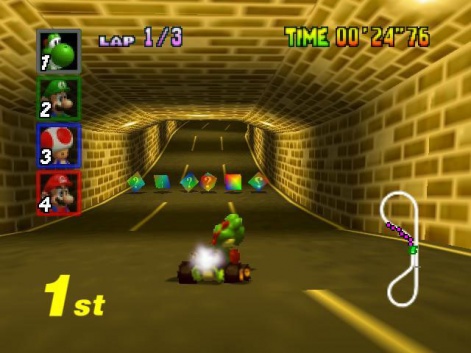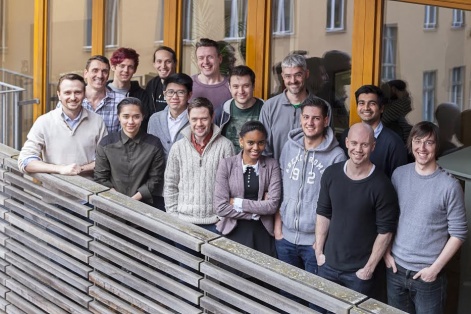Such is Kyle Smith's pride in the TreasureHunt team, he says that “if it weren't creepy, I'd keep pictures of them in my wallet".
But the Berlin startup didn't arise in the usual way, organically between a bunch of friends or colleagues.
Rather, talking to PocketGamer.biz at Gamescom, Smith admits that the formation of the studio was “very much brute-forced from the start".
Officially founded in 2014, but only scaling up to a full team six months ago, TreasureHunt currently has two unannounced games in development.
Its first title is broadly in the vein of casual mobile games we've seen before, while the latter is a more ambitious effort that is a clearer representation of what the studio wants to achieve.
Meeting of minds
The studio houses 17 staff boasting experienced and diverse talent, and its three co-founders are a microcosm of this diversity.
CEO Kyle Smith was formerly a Lead Designer at EA Vancouver. Chief Marketing Officer Ville Mikkola has a background in UA, with stints at marketing agencies Yeahmobi and Glispa.
And the third co-founder, Senior Advisor Martin Kern, is inexperienced in gaming but has been building businesses since 1999.
Smith's approach in the early days was to surround himself with people “who were really good at what I wasn't".
And indeed, this is an approach that prevails at TreasureHunt to this day.
He explains that the studio is built upon a “trickle-up” philosophy: “My goal as the CEO is to be the dumbest guy in the company.”
Feel dumb, hire smart
But to make this possible, the firm has had to set incredibly high standards when it comes to recruitment.
Lead Designer John Kelly, for example, was previously Game Design Manager at Rovio and Lead Designer on Farmville at Zynga.
TreasureHunt can also count alumni of Kabam and King among its employees.

For Smith, the importance of hiring the right people cannot be overemphasised.
“We have a saying internally that making games gets in the way of recruiting people,” he says.
“Some of these leads that we have, I courted for six to 12 months and just wouldn't take no for an answer.”
Challenge as incentive
Smith says the secret to winning over such established names to an unproven startup is to show them a coherent vision of where you want to be in five years.
We all make less than we did before. We're doing it for the right reasons.Kyle Smith
The harder and more ambitious, the better.
“They don't want to hear 'it's going to be fun and chilled out'; the really high-performing folks want challenges and to work with people that challenge and teach them,” he explains.
“This is what tempted some away from incredibly cushy positions, and we all make less than we did before. We're doing it for the right reasons.”
Big ambition
So, what exactly is the vision that the TreasureHunt team have been persuaded to take a gamble on?
“We want to be the leader in mobile multiplayer games for all audiences,” declares Smith. “All audiences being a ‘Pixar-like’ audience.”
Smith refers to Pixar multiple times throughout our interview and it's clearly a major inspiration.
“Ed Catmull, the guy that runs Pixar who I respect immensely, draws this paradigm where you've got business on one side and art on the other,” he explains.
“You should be in the middle all the time, because if one side wins, the other side loses - and then you lose.”
Social beasts
Smith reckons that there's a solid argument in favour of inclusive mobile multiplayer on both sides.
“If you lined up 100 people and you say 'would you rather play a game alone or with a group on your own terms?', 100 of those people would say with a group,” he states.
“There's some super amazing [mobile] multiplayer games out there - Glu does amazing stuff, and Supercell on the midcore/hardcore side - it just hasn't happened [for all audiences] yet.”
Mario Kart is a benchmark for the studio; a synchronous, skill-based multiplayer game aimed at a specific audience, but popular and playable more widely.

Smith believes that it's only a matter of time before we see a similar experience blow up on mobile - but is under no illusions that TreasureHunt is the only studio with that aim.
“We're probably not the only ones working on this right now,” he considers.
“But we're looking at it in a much more focused and aggressive way than a lot of folks.”
Keeping the balance
It's a considered approach, too.
For F2P live multiplayer, it's important to soften the walls a bit.Kyle Smith
While TreasureHunt values traditional multiplayer experiences - based on real-time competition, tournaments, etc. - it's also well aware of the metagame demands of any successful, modern mobile game.
“You need something that is evergreen, that can live by itself without us, and is quite infinite. We want to get quite good at that early on,” says Smith.
“Clash Royale is a pretty substantial example of this.”
Monetisation is also a subject that Smith and TreasureHunt have clearly considered deeply.
“What's really important for free-to-play live multiplayer is that you have to soften the walls quite a bit,” he ponders.
Softly, softly...
As with seemingly everything at TreasureHunt - Smith himself is candid that he “Frankensteined the studio together” out of various inspirational sources, from Google to Bungie - there is an example that the studio particularly aspires to.

When it comes to monetising competitive free-to-play games, it's Hearthstone.
“Blizzard trusted their audience and said 'here's the entire game'… you can get every card at a pretty decent rate for free,” he says.
“I think you average out at about $2 of free currency a day if you do all your quests.
“You feel like you have the full package, and if you're serious about competing, you can invest in getting the cards you want.”
TreasureHunt's next game is set to soft launch in early 2017.






















